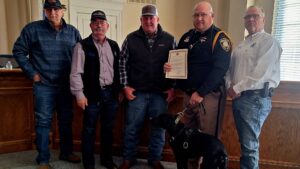For the third week in a row, the Board of County Commissioners placed debris left in right-of-ways by OG&E on the agenda. Chair Newt Stephens began the discussion by stating Creek County Emergency Management sent emails to the State Emergency Management Agency regarding State reimbursement for clearing tree debris left by OG&E from the July 17, 2023 storm. CCEM was advised the State would not reimburse Creek County for removing debris from right-of-ways.
“In my twelve years, I have never had this happen,” Stephens said. “We have been through a lot of storms, never had to deal with this after the storm.”
District #2 Commissioner Leon Warner said his district was not equipped to deal with the massive undertaking. “We don’t have the resources to deal with this. We are going to have to look at maybe hiring contractors. We are talking about thousands of truckloads of debris, here,” Warner said, pointing out that there were 200 miles of county roads to be cleaned up.
Counsel Andrew Goforth advised board members that FEMA may indeed reimburse the county for the debris left by OG&E, but the reimbursement would only be 75 percent, and that the work had to be done within the 30-day limit of the State Declaration of Emergency. It could also reportedly take up to two years to receive payment from FEMA.
Commissioner Warner expressed concern about the amount of time it would take to clear the debris and the ramifications for reimbursement. “Let’s say it takes a year or two to dispose of this stuff, how do we handle the 30 days of the event (clause)?”
In response, Goforth answered, “It would just have to be documented. We are still in the 30 days at this point, so I think we need to document what’s there,” he said.
Warner remained concerned about funding. “How are we going to fund this?” he asked. “I don’t have that kind of money to do this.”
It was at this point that Stephens addressed OG&E representatives Chris Martin and Alba Weaver directly. “Why did you all do this this time?” he asked. “In my twelve years of being an elected official, I have been through multiple storms. They have always come behind and mulched up (the limbs) just like it was regular vegetation.”
Martin said that the tree limbs left by OG&E after the storm didn’t fall into the same category as their normal maintenance.
“For our maintenance activities, we will haul away the brush,” he said. “But when it is a storm, it is an act of God, it is not scheduled maintenance,” Martin says that’s been OG&E’s policy for the five years he’s worked with them.
Stephens was not swayed. “We all ride for the same brand,” he said. “but after the fact, to come in—you can call it what you want to—it was still vegetation maintenance. I was out there, there were no line crews in the area. It was nothing but boom trucks and chainsaws.” Stephens added that he saw crews cutting the trees and placing the limbs and debris in the county right-of-way and that he felt OG&E was “blatantly abusing he county. This is just beyond fathoming,” he said.
Warner wanted clarification: “Your policy is to drag it into the county right-of-way?” he asked.
“The policy is if it is a residence we drag it to the front, so we are trying to take it to the curb,” Martin replied. “We are trying to compromise, we are trying to place it in available positions (to be hauled off).”
Stephens reminded Martin that OG&E requires a county utility permit for doing anything that “touches our dirt. Vegetation, changing poles on the ground—anything like that—does require a utility permit from Creek County. It has been that way for a long time. We don’t charge for them, but it is required.”
Alba Weaver, Economic Development and Community Affairs explained to the board the difference between the recent June storms and other, smaller storms.
“The difference between these two storms is that you normally do not see what we experience with the smaller thunderstorms across the state,” she said. “This happened across the entire footprint of our service territory.”
Weaver insisted OG&E was not “taking advantage,” as Stephens had put it, and was not doing regular maintenance. “We were simply going back to those assessment points that needed to be brought up to our standards,” he said.
Stephens, who was visibly angry, argued: “You saved on your vegetation maintenance funding and put the burden on the county. This is four days after the power in my area had been restored on Sunday,” he said. “Everything was running. On Thursday, you come back in and do this to the county. We used to be good neighbors and work together, it 100-percent gives the appearance of ‘we don’t care, not my problem.’”
Warner agreed, and while he praised OG&E for restoring power quickly, he said the power company was negligent in fulfilling the other part of the job, which is cleanup. Martin replied that it was “an act of nature” and the debris would not be hauled away.
Warner then asked Martin if OG&E would assist in repairing roads damaged by runoff caused by debris. “If we don’t take care of this very quickly, the ditches won’t flow properly, the water gets in the road and tears the toad up,” he said. “Are you going to help us with that?” he asked, before adding “I know the answer to that, you don’t have to answer, it is a rhetorical question.”
Weaver told the board that her company was “internally looking at other options,” and later told Stephens, “You and I have spoken, I have taken back your concerns internally and we are trying to identify solutions.”
Stephens told Weaver that OG&E has money budgeted for situations like this. “You have to have a station management budget, that is something you have to do. To me, from the commonsense side of it, you are saving a ton on that because you are able to get reimbursed for it. Why wouldn’t you just be a good neighbor, and be a good friend, and use that budget to clean it up? You don’t have the boom trucks or the chainsaws, you just have the guys that come back to do the grinding. You are still going to be in the plus, you are not getting an unbearable burden on the county and being a good steward and a team of the area, but to just absolutely walk off and leave that, I just can’t get past that.”
After the long and heated discussions, Warner asked if there were any ARPA funds that could be used to pay for the cleanup. The board took no action and the item will be placed on the next agenda.
In other business, it was announced that the County had received applications for the position of Treasurer from Jeff Sparks, Rick Engleman, Brian Borden, and Joseph Bell. The candidates will be interviewed in executive session next week.
Leon Warner was also appointed as the County member of the review committee of the Sapulpa Tax Increment Finance District.
The BOCC meets every Monday at 9 a.m., in the upper meeting room of the Collins Building.










